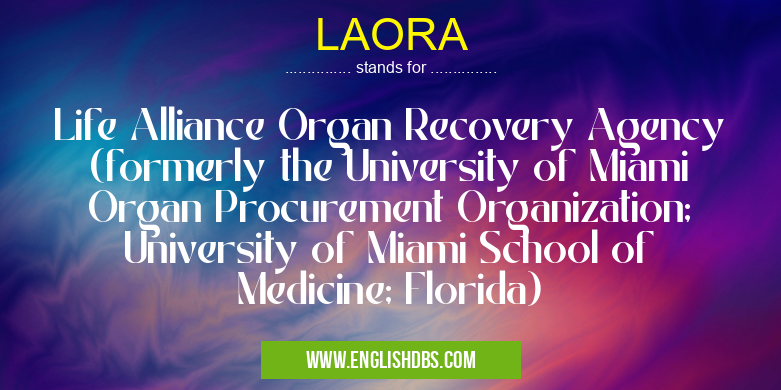What does LAORA mean in AGENCIES
The Life Alliance Organ Recovery Agency (LAORA) is a nationally-recognized organ procurement organization affiliated with the University of Miami School of Medicine in Florida. It was formerly known as the University of Miami Organ Procurement Organization and was established in 1989 to support the donation and distribution of organs within the United States. As a member of the national recovery system, LAORA provides essential services such as organ recovery, allocation, donor registry, donor safety, patient safety, public education and research. The goal of LAORA is to help improve all aspects of organ donation and transplantation by providing state-of-the-art services and resources to ensure donor safety while helping to ensure that those waiting for transplants receive organs in a timely manner.

LAORA meaning in Agencies in Business
LAORA mostly used in an acronym Agencies in Category Business that means Life Alliance Organ Recovery Agency (formerly the University of Miami Organ Procurement Organization; University of Miami School of Medicine; Florida)
Shorthand: LAORA,
Full Form: Life Alliance Organ Recovery Agency (formerly the University of Miami Organ Procurement Organization; University of Miami School of Medicine; Florida)
For more information of "Life Alliance Organ Recovery Agency (formerly the University of Miami Organ Procurement Organization; University of Miami School of Medicine; Florida)", see the section below.
Services
LAORA provides comprehensive organ recovery services including tissue typing testing, pathology reports, rapid transport systems, medical review boards and medical chart reviews. In addition, LAORA works closely with local hospitals to provide education on donation criteria, consent procedures and post-death care for donors. It also collaborates with organizations involved in public awareness campaigns about organ donation to educate potential donors about their options. Finally, it administers post-transplant follow-ups with patients who have received an organ from LAORA's donor pool.
Essential Questions and Answers on Life Alliance Organ Recovery Agency (formerly the University of Miami Organ Procurement Organization; University of Miami School of Medicine; Florida) in "BUSINESS»AGENCIES"
What is Life Alliance Organ Recovery Agency?
Life Alliance Organ Recovery Agency (LAORA) is a non-profit, federally-designated organ procurement organization affiliated with the University of Miami School of Medicine in Florida. Its mission is to improve lives through organ and tissue donation, transplantation, and research.
What services does LAORA provide?
LAORA provides an array of services related to organ and tissue donation, including donation coordination, public education and awareness programs, donor family support services, and research into the latest advancements in organ and tissue donation.
How can I become an organ donor?
In most states you can register your decision to be an organ donor by signing up at your local Department of Motor Vehicles when applying for or renewing your driver's license or state identification card. Check online or with your local DMV for more information about how to register as an organ donor in your state.
Is it safe to be an organ donor?
Yes! Receiving a donated organ does not affect the quality of life for the recipient. Thanks to advances in medical technology, today's transplant surgeries are much safer than ever before and have very high success rates. People who donate organs may not experience any ill effects from the process if they meet all medical criteria for donating safely.
Who pays for the costs associated with donating organs?
Costs associated with a deceased donor's evaluation, testing and retrieval are paid by insured programs such as Medicare or Medicaid or insurance companies that pay hospital bills on behalf of individuals who donate their organs. For living donors, depending on their own personal circumstances costs may be covered in part by their health insurance carrier or other sources such as assistance through community organizations or government funded programs including Medicare and Medicaid.
How long do transplanted organs usually last?
The average lifespan of a transplanted kidney is 12 years; however, this varies widely depending on the age at which it was transplanted, as well as any other medical conditions that could potentially impact its longevity. The average lifespan for liver transplants is 10 years; however, some livers can last more than 20 years if well maintained by healthy lifestyle choices such as regular exercise and eating a balanced diet.
How many lives can one person save by becoming a registered donor?
Through registering to become an organ donor you can potentially save up to eight lives — one through donating your heart, two through donating lungs and livers each along with giving two kidneys away — plus you can also help up to 50 people by donating tissues such as corneas, skin and bone marrow.
Final Words:
LAORA strives to improve outcomes for both donors and recipients through efficient systems that ensure patient safety while providing assistance towards a successful transplant surgery. From education and research initiatives to coordination between multiple organizations involved in the transplant process - LAORA empowers individuals seeking lifesaving transplants while doing its part to honor the generous gift of organs donated by others.
